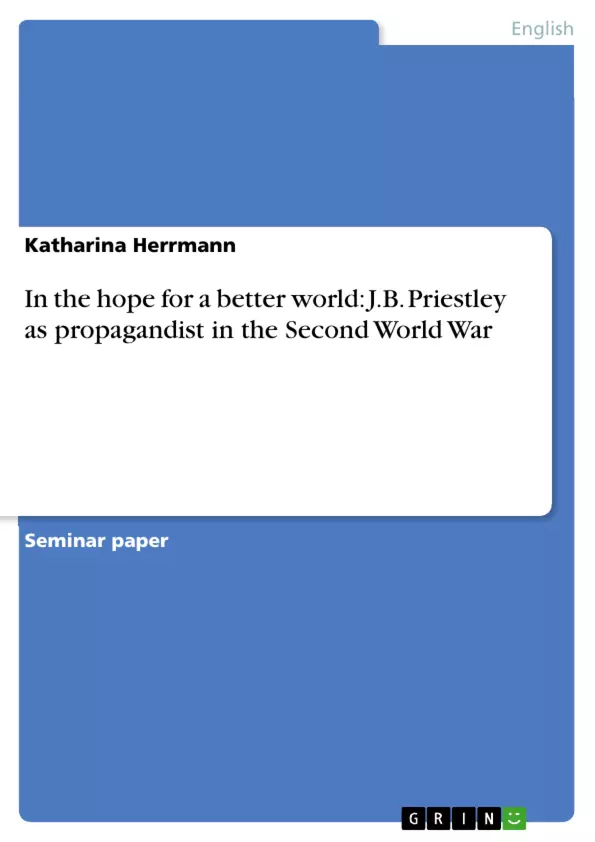Having served as a soldier in the First World War, Priestley knew about the importance of the maintenance of Home Front morale in times of war. J.B. Priestley was a very skilful broadcaster who knew how to create a foundation of trust between himself and his audience, namely by identifying with the ordinary British population, and by letting them take part in his own life and experiences. He managed to maintain the morale of his compatriots by glorifying them in their ordinariness and by juxtaposing their naturalness, courage and their ability not to let the war get them down to the soulnessness of the German military machine, devoid of all human feeling. Through his criticism and verbal attacks on the Nazis, Priestley surely might have won recognition on the part of the Churchill government but the fact that he openly expressed his views about the necessity of a fundamental reconstruction of the society after the end of the War, which was mostly connected to his liberal socialist ideals, nevertheless made him fall out of favour with the government since it refused to commit itself to any post-war programmes. As a consequence of the ongoing quarrel with leading officials of the BBC and the Ministry of Information, Priestley was forced to quit his Postscripts in March 1941 and refused to accept the offer of returning to microphone some weeks or months later. Priestley even accused the BBC and the Ministry of being a “political Gestapo”. Although Priestley is very critical about his Postscripts in his autobiography Margin Released (1962), one single sentence perhaps resumes best his role during the blitzkrieg: “To this day middle-aged and elderly men shake my hand and tell me what a ten-minute talk about ducks on a pond or a pie in a shop window meant to them, as if I had given them the Eroica or King Lear.”
Inhaltsverzeichnis (Table of Contents)
- Introduction
- J.B. Priestley and the BBC
- The role of the wartime BBC
- The Postscripters
- The Postscripts
- What are the Postscripts?
- The Postscripts as morale boosters
- Close reading of Postscript 5 June, 1940
- Denunciation of the Nazis
- Glorification of the British
- The Postscripts as propaganda for Priestley's own cause
- Post-war reconstruction
- Socialist ideas
- The audience's attitude towards Priestley and the Postscripts
- Concluding remarks
Zielsetzung und Themenschwerpunkte (Objectives and Key Themes)
This paper examines the role of J.B. Priestley as a propagandist during World War II, focusing specifically on his BBC broadcasts. It analyzes the influence of his Postscripts to News on public morale and the potential of his broadcasts to promote post-war reconstruction and socialist ideas. The paper concludes by exploring audience responses to Priestley's broadcasts and the reasons behind his popularity.
- The role of the BBC in wartime propaganda and public morale
- The impact of Priestley's Postscripts on British audiences
- The propagandist potential of Priestley's broadcasts for social and political change
- Priestley's use of the Postscripts to promote his own vision of post-war reconstruction and socialist ideals
- Audience reception and the popularity of Priestley's broadcasts
Zusammenfassung der Kapitel (Chapter Summaries)
The introduction provides an overview of J.B. Priestley's diverse career and highlights his significance as a broadcaster during World War II. It outlines the paper's focus on Priestley's collaboration with the BBC, his Postscripts to News, and their impact on public morale and post-war reconstruction.
Chapter 2 explores the role of the BBC in wartime Britain, emphasizing its importance as a primary means of communication. It discusses the BBC's development as a public service broadcaster and its unique position compared to continental radio stations. The chapter also examines the BBC's critical role in boosting public morale and disseminating war propaganda.
Chapter 3 examines the genesis and nature of the Sunday Postscripts, highlighting their role in broadcasting the "voice of the people." It focuses on Maurice Healy, the initial Postscript broadcaster, and his shortcomings. The chapter introduces J.B. Priestley's arrival as a Postscript broadcaster, exploring his background, popularity, and influence.
Chapter 4 investigates the content and impact of Priestley's Postscripts, examining their effectiveness as morale boosters during the Blitz. It delves into Priestley's denunciation of Nazism, his appeals to national unity, and his critiques of officialdom. The chapter also explores the growing controversy surrounding Priestley's broadcasts and his increasing conflict with the government.
Schlüsselwörter (Keywords)
This work focuses on the following key themes and concepts: wartime broadcasting, propaganda, public morale, J.B. Priestley, the BBC, the Postscripts to News, post-war reconstruction, socialist ideas, and audience reception.
- Quote paper
- Katharina Herrmann (Author), 2008, In the hope for a better world: J.B. Priestley as propagandist in the Second World War, Munich, GRIN Verlag, https://www.grin.com/document/163078



